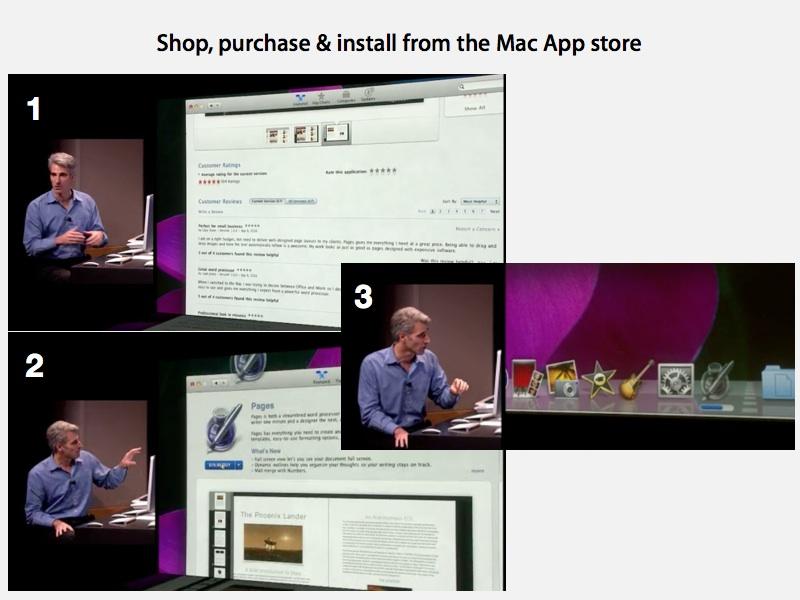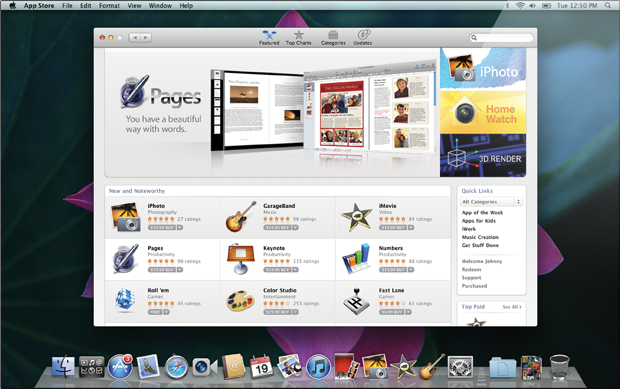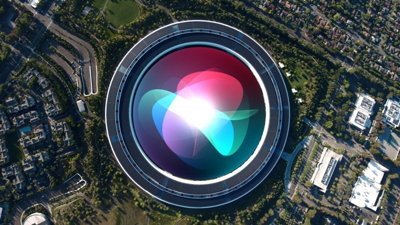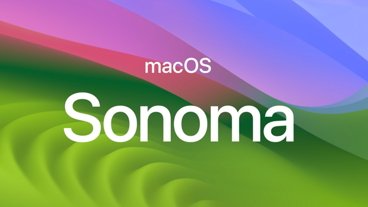Mac App Store developers aim for low prices, high volume
Apple announced its intention to launch a Mac App Store less than three months ago at its October "Back to the Mac" event, which centered upon iLife '11 and the forthcoming release of Mac OS X 10.7 Lion.
The company clarified that its Mac App Store was such a priority that it planned to have it up and operational within 90 days, well ahead of the release of Lion. In December, Apple announced that its Mac App Store would open to users in 90 countries starting January 6, a couple weeks ahead of schedule.
The new Mac App Store will, like its iOS counterpart, offer easy shopping with customer reviews, one click downloads and software installation, and automatically notify users when updates are available.
Looking for clues on App Store pricing
Since its first demo, the Mac App Store has generated interest in how it will differ from the mobile iOS version, where most apps are a dollar or two, and very few are more than $5 or $10.
In its own initial presentation of the new App Store, Apple portrayed its iLife apps as listing for $15, and iWork apps being sold individually for $20, roughly the same as those apps currently sell for together in their existing suite packages, but much higher than the $5 version of iMovie for iOS, or the $10 versions of iWork apps available for iPad.
The company also listed a few fictitious titles to fill space, priced between $3 for a utility, $5 for a game, and $30 to $40 for more apps that appeared to be more complex. Those figures were significantly higher than typical iOS titles, but generally lower than existing retail Mac software.
Existing iOS apps likely to remain cheap
An informal survey conducted by Markus Nigrin of the Pocket Cyclone blog suggests that many developers are actually hoping to clone the success of their iOS apps using similar prices, gunning for volume sales that can get them noticed in app popularity charts.
Four game developers Nigrin interviewed: Dave Frampton of Majic Jungle Software(Chopper 2); Bryan Duke of Acceleroto (Air Hockey); Matt Martell of Mundue (reMovem) and Craig Kemper of Little White Bear Studios (Compression) each said they planned to price their new Mac titles at or within a dollar of their existing, and successful, iOS titles.
Bringing iOS apps to the Mac App Store will be easy because, as Nigrin points out, "Apple made the code re-use for a native Mac app very straightforward. Every dev I talked to mentioned porting times of less than four weeks. Which were mostly spent on all types of adjustments, like keyboard and HD support."
Nigrin noted that most iOS game developers create their graphical assets at higher resolutions than currently necessary on iOS devices in order to future proof their work in anticipation of "HD" devices on the horizon. That makes bringing their titles to the Mac easy and cheap, supporting their ability to offer Mac apps at similarly low price points.
Mac vs iOS developers
On the other hand, some Mac developers are stuck in the mindset that programs should be priced at $50 to $100. "I heard some stories from classic Indie Mac Software developers," Nigrin wrote, "who think their whole strategy will be to determine if they add the 30% Apple cut to their old price or if they should just keep their price levels."
Apple charges developers a flat 30 percent cut of the software sold through its App Stores; although that fee is less than most retailers charge for any product, it's something app developers could sidestep by selling their own work directly. The problem is that setting up a digital store and finding buyers yourself is challenging and potentially expensive to do.
Nigrin also described a 'technical battleground' between existing Mac developers and iOS shops, with Mac devs trying to "push the notion that 'ported iOS' apps are somehow inferior to native Mac apps."
That is a "very questionable claim," Nigrin said. "We are not talking about a cross-platform approach with ugly design elements, a meta compiler and three daisy-chained interpreters to get these apps to run. This is as native and as natural as it can get and Apple did a great job paving the way."
 Daniel Eran Dilger
Daniel Eran Dilger












 Andrew Orr
Andrew Orr
 William Gallagher
William Gallagher

 Mike Wuerthele
Mike Wuerthele
 Christine McKee
Christine McKee

 Malcolm Owen
Malcolm Owen
 Amber Neely
Amber Neely







